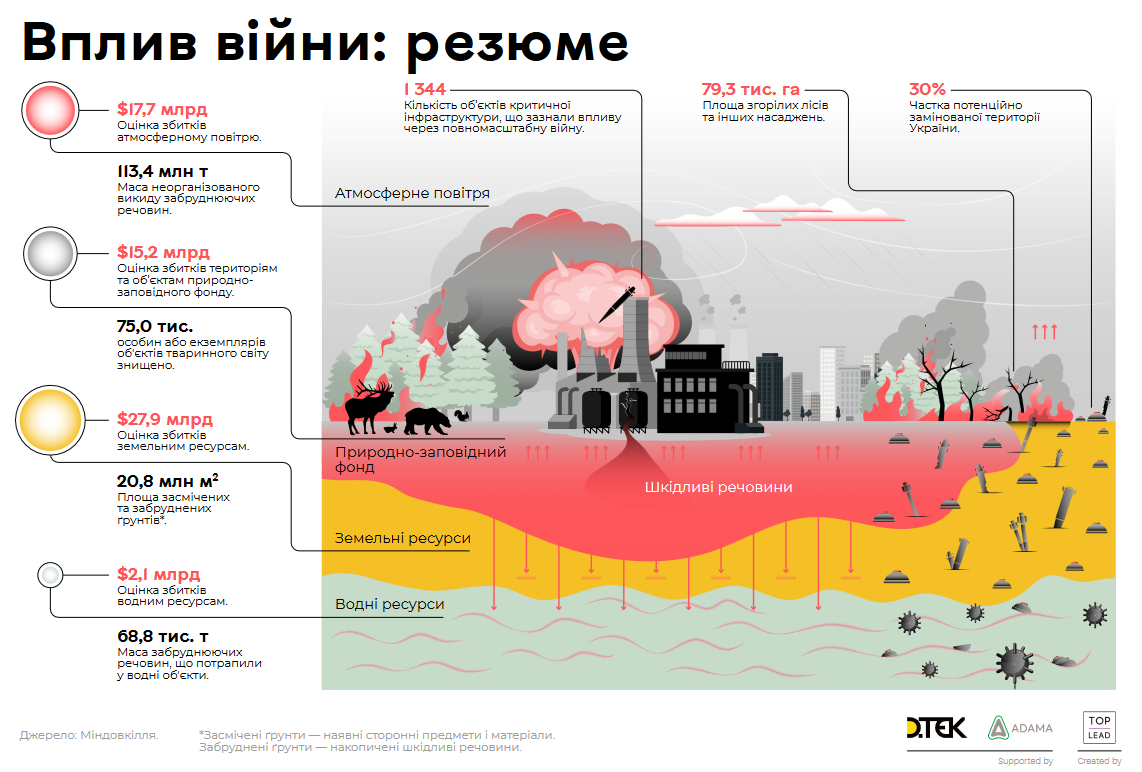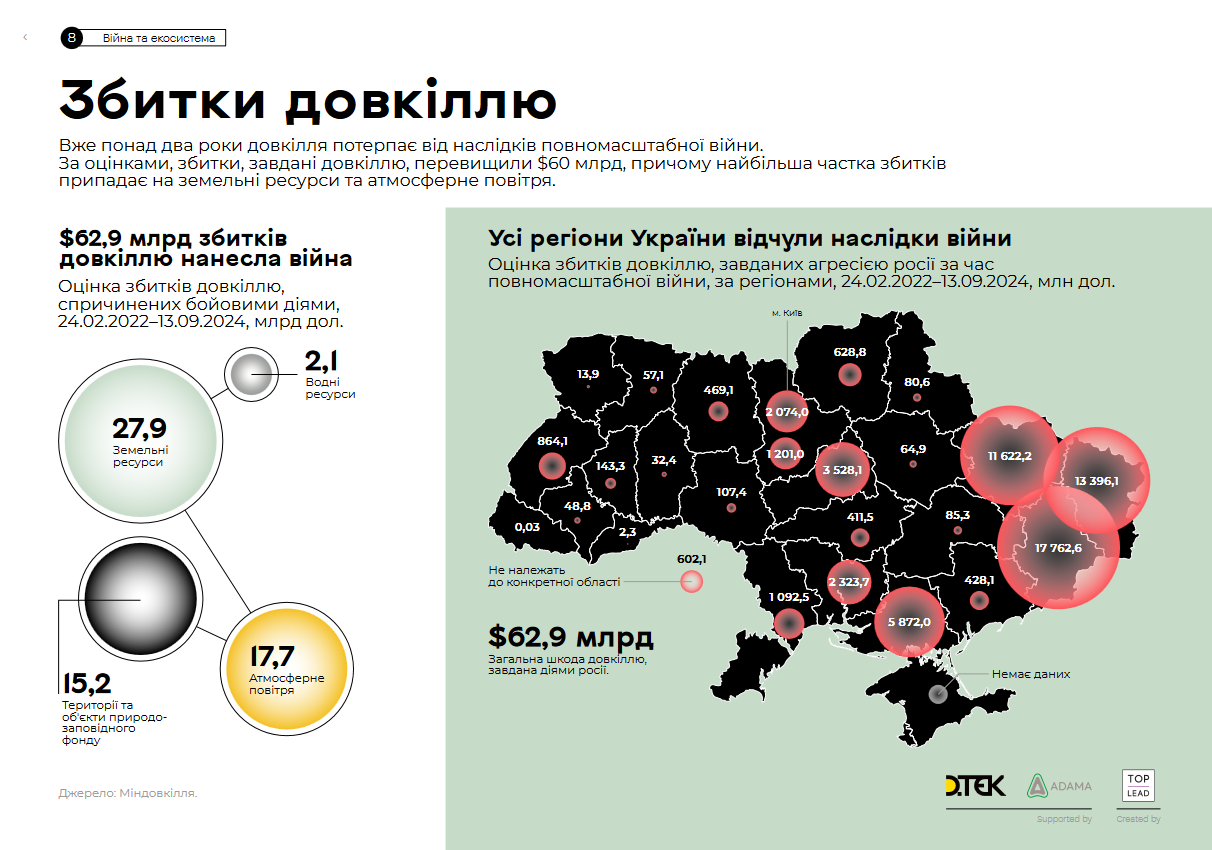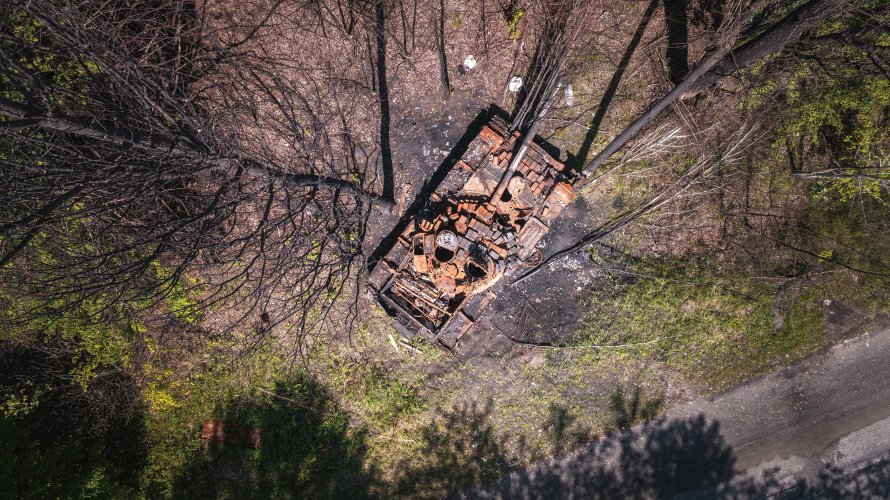For the third year in a row, the International Day for the Prevention of Exploitation of the Environment during War and Armed Conflicts, which is celebrated on November 6, resonates particularly strongly with Ukrainians. Today, in the conditions of a brutal war in our country, the topic of environmental protection takes on special importance.
On this day, EcoPolitic prepared for its readers basic information about how the war affects the environment of Ukraine.
Summarized data on the environmental damage from the war are contained in the recently released annual report "The Russian-Ukrainian War: Environmental Impact 2024". It is on him that we will rely, assessing the ecological consequences of the war for Ukraine.
Damage to the Ukrainian environment during the full-scale war in numbers
The total figure of environmental losses from military operations on the territory of Ukraine from February 24, 2022 to September 13, 2024 amounted to almost $63 billion. Land resources suffered the greatest environmental damage – 44% of the total amount. By environmental components, they are distributed as follows:
- $17.7 billion – damage to the atmosphere due to emissions of pollutants during the shelling of Ukrainian cities, the conduct of hostilities and fires caused by them;
- $15.2 billion – damages to the territories and objects of the Nature Reserve Fund of Ukraine;
- $27.9 billion – damage to land resources from pollution and clogging from military actions and mining of territories;
- $2.1 billion – damages to water resources caused by pollution of water bodies.

Source: topleadprojects.com.
Environmental damage from military operations in Ukraine
The top three regions in terms of environmental damage during the full-scale invasion naturally included the Ukrainian regions where the most intense fighting is going on: Donetsk, Luhansk and Kharkiv. For the Autonomous Republic of Crimea, which has been under occupation since 2014, there are no data on environmental damage from the war.
Recorded damage to the environment by region of Ukraine is:
- Donetsk – $17,762.6 million.
- Luhansk – $13,396.1 million.
- Kharkiv – $11,622.2 million.
- Khersonska – $5,872.0 million.
- Cherkassy – $3,528.1 million.
- Mykolayivska – $2,323.7 million.
- Kyiv – $2,074.0 million.
- Kyiv – $1,201.0 million.
- Odesa – $1,092.5 million.
In other regions, the amount of environmental damage from the war does not exceed $1 billion.

Source: topleadprojects.com.
Environmental consequences and problems: how the war destroys the nature of Ukraine
Among the main consequences of the destruction of nature and related problems, the authors of the report named:
-
- A dramatic increase in the number of fires. Their main war-related causes were artillery fire, UAV attacks, and missile strikes.
- Environmental and climate risks due to infrastructure damage. Violation of their work creates a threat of environmental pollution and can cause an ecological disaster.
- Destruction of ecosystems. Experts note that military actions cause significant, sometimes irreversible losses of biodiversity, destroy valuable natural environments and endanger the existence of rare species of plants and animals.
- Destruction of Ukrainian soils. They suffer the most damage: the passage of heavy equipment, the construction of fortifications, explosions of shells and rockets, which lead to chemical reactions, negatively affect the condition of the soil.
- Destructive consequences of blowing up the Kakhovskaya HPP.
- Pollution of all components of the environment.
On the International Day for the Prevention of Exploitation of the Environment during War and Armed Conflicts, it is important to remember the need to protect nature during conflicts. We must make efforts to preserve our natural resources and ecosystems. Ukrainian ecologists and international organizations are already actively working on documenting environmental crimes in order to bring the aggressor to justice.
Earlier, EcoPolitic wrote that in the soils of the de-occupied Mykolaiv Oblast discovered increased content of heavy metals. We also reported that during a full-scale war Ukraine lost more than 1,000 hectares of forest in the occupied territories.





